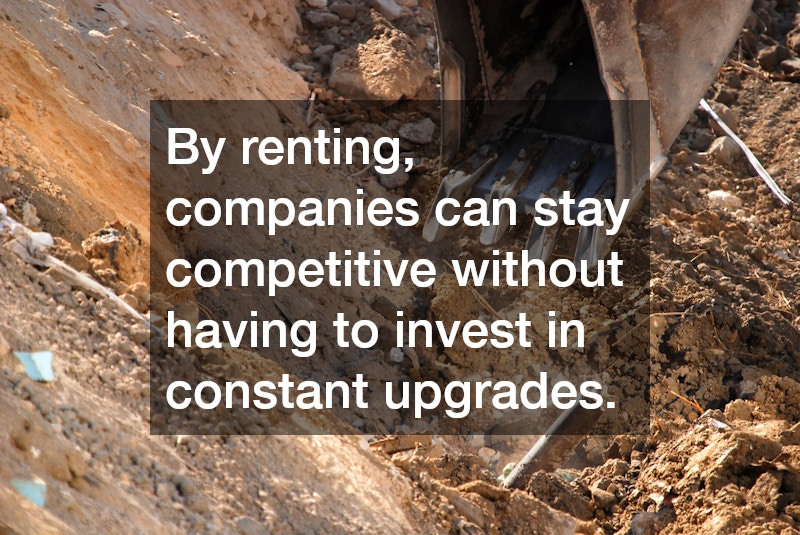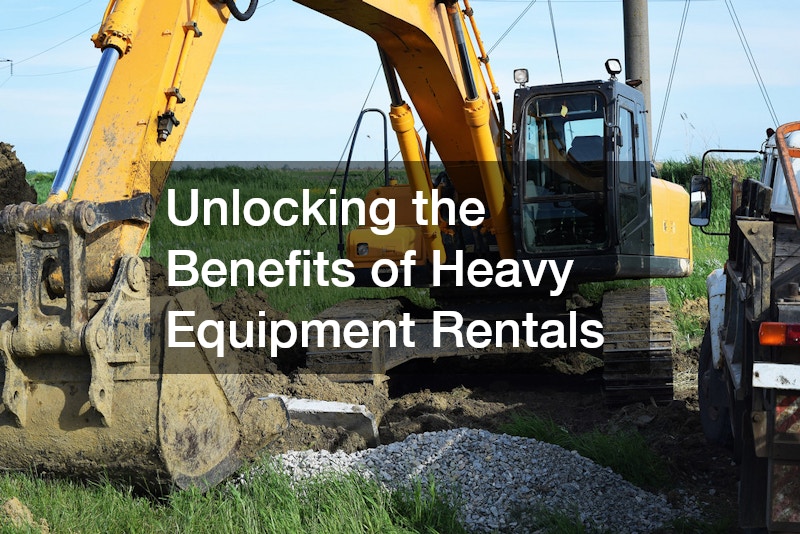In the dynamic world of construction and infrastructure development, heavy equipment rentals have revolutionized the way projects are executed. This article explores the myriad advantages of opting for rental services instead of purchasing and maintaining hefty machinery. From substantial cost savings to operational flexibility, we delve into why heavy equipment rentals are becoming the go-to solution for many companies.
The Financial Advantages of Renting Heavy Equipment
One of the foremost benefits of heavy equipment rentals is the potential for substantial cost savings. Purchasing construction equipment often requires a significant initial investment, which might not be feasible for all businesses.
By choosing to rent equipment, companies can allocate their financial resources more effectively, reducing the financial pressure of acquiring expensive machinery. In addition, renting eliminates the costs associated with depreciation, allowing for better financial planning. By leasing instead, businesses also avoid the burden of storage fees, freeing up capital for other crucial project aspects.
Another financial benefit of heavy equipment rentals is the flexibility it provides in budgeting. Rather than tying up substantial capital in purchasing machinery, businesses can forecast expenses more accurately when renting. Rentals come with fixed costs, allowing project managers to better estimate the financial requirements for specific job durations. This predictability in expenses can lead to more strategic financial planning and allocation. Moreover, the risk of owning underutilized or obsolete equipment is mitigated, ensuring companies only pay for what they need, when they need it.
The tax implications of renting equipment instead of purchasing it is another financial aspect to consider. Rental expenses can often be deducted as business expenses on tax returns, providing companies with additional savings. This deduction can be particularly advantageous for smaller construction firms or startups that aim to manage their tax liabilities efficiently. Conversely, owning equipment often involves paying sales tax upfront and dealing with long-term depreciation, which can complicate financial management. In essence, renting aligns better with many companies’ strategic financial goals by maximizing savings and improving cash flow.
Operational Flexibility and Efficiency
Heavy equipment rentals offer unparalleled flexibility in project management and execution. When companies can access various types of machinery precisely when needed, it leads to increased operational efficiency. The ability to rent specific equipment for different project phases eradicates the logistical nightmare of transporting owned equipment across multiple sites. This flexibility ensures that the right tools are always available, minimizing project delays and speeding up completion times. Consequently, companies can adapt more swiftly to changing project scopes or unexpected challenges, enhancing overall productivity.
Another aspect of operational flexibility offered by equipment rentals is access to cutting-edge technology without the burden of ownership. Rental companies continually update their fleet to include the latest models and technologies, ensuring clients have access to modern, efficient machinery. This access means businesses can leverage improved performance and fuel efficiency, translating to lower operational costs and reduced environmental impact. Up-to-date equipment can also offer enhanced safety features, protecting the workforce and reducing the risk of accidents. By renting, companies can stay competitive without having to invest in constant upgrades.
Renting equipment also supports workforce efficiency through ease of use and minimal maintenance requirements. Rental services usually include fast equipment delivery, straightforward setup, and ongoing support, which helps companies focus more on project execution rather than equipment management. In this way, crews can concentrate on their tasks with minimal disruptions or learning curves, enhancing the seamlessness of operations. The support provided by rental companies often includes maintenance, ensuring machinery is always in optimal working condition. As a result, operational productivity is maximized, while downtime due to equipment failure is minimized.
Mitigating Risks with Heavy Equipment Rentals
Risk management is a critical component of construction projects, and heavy equipment rentals present a solution to mitigate equipment-related risks. Equipment ownership comes with various risks, including the potential for machinery to become outdated or obsolete. Rentals alleviate this concern by offering businesses access to modern equipment that meets current regulatory standards and technology advancements. This access ensures compliance with safety and environmental regulations, shielding companies from potential fines and legal issues. Thus, rental services provide an effective way to manage compliance risks, aligning with long-term business resilience strategies.
Furthermore, heavy equipment rentals can significantly reduce the risk associated with equipment maintenance and repairs. When companies own equipment, they are solely responsible for maintenance costs and repair downtime, which can be financially burdensome. In contrast, rental agreements typically include maintenance and repair services, transferring the risk to the rental provider. This not only ensures equipment is well-maintained but also enables quick repairs or replacements, preventing project delays. By mitigating maintenance risks, companies can redirect their resources towards core project objectives, refining operational focus.
Insurance considerations are also a crucial factor in risk mitigation when opting for rentals. Rental companies often provide insurance coverage options, reducing the liability on the rental company. This provision can protect against potential losses from equipment damage or theft without needing to pursue standalone insurance policies. By minimizing these risks, businesses can focus on project execution with peace of mind. Overall, heavy equipment rentals create a safety net that prevents risk overload, safeguarding the company’s human and financial resources.
.

